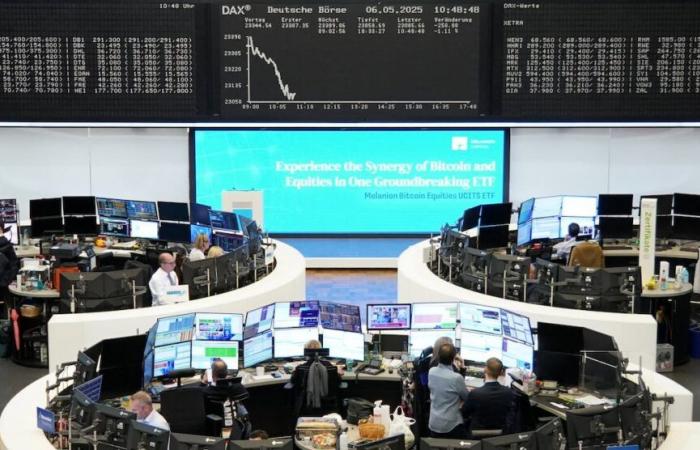
day of strong emotions in the German Stock Exchange. The surprising initial decision of the Bundestag not investigating the Democristian Friedrich Merz as a chancellor caused a fall greater than 2% in the Dax, the index that brings together the 40 largest companies in the country. The political uncertainty maintained the strong losses during part of the session, until the call of a new vote and, finally, the choice of chancellor in a second attempt blurred the red numbers, which were reduced to 0.46% at the end of the session.
Against all prognosis, a sector of Parliament – probably from the social democrats, with which it agreed to form coalition, although all are speculation because the vote is secret – opted in the first vote for opposing their choice, a decision left by the Foreign Ministry in Limbo, subject to the maximum period of 14 days for the vote to be repeated. Uncertainty does not like markets, so the reaction was immediate: the Dax passed in a few minutes of falling around half a percentage point to be left more than 2%, although the descents were moderated as the market envisioned a second vote that will relieve the nerves.
Investors have high hopes at Merz, a former Blackrock manager, the planet’s largest asset manager. Its ambitious expense plans – a mass indebtedness in defense and a fund of 500,000 million euros for infrastructure and environment – appear on the horizon as a way of reactivating the economy from which many companies would take advantage of. Therefore, his initial defeat (he obtained 310 votes and needed 316) generated a moment of doubts that resulted in sales in the German stock exchange. Together, the CDU adds, with the CSU and the Social Democrats 328 supports, but for the stability to return, the Discolos need to be sent, once the message of rejection of Merz was sent, they returned to the party discipline, as they finally did.
The German stock market was, during most of the day, the one that behaved from among the main parks of the continent. At its worst, only three of the 40 Dax values (Fresenius pharmacist, electric E.ON, and Symrise chemistry) resisted positively, and some of their most dated names lost more than 2%. That was the case of Porsche, Basf, Infineon, Airbus, Sap, Siemens and Daimler.
The stupor for what happened in the first power of the euro quickly moved to other indexes, although with less drama. The Spanish Ibex 35, which began the session in green, changed meaning, such as Paris and Rome. But the happy ending in Berlin returned to Ibex to optimism, and closed the session slightly positive, marking new 17 years beyond 13,500 points.
-At certain times of the session the worst was feared. The MDAX, an index that includes the 50 German companies that follow the DAX in size (a kind of second stock division), fell more than 3%. But the brief negotiation period that followed the first failed vote served for Merz to close the fissures that had been presented in the coalition (before even officially starting).
Despite the turbulence on Tuesday, the balance of the German stock market this year is still very positive: cattle 16% since it began 2025, and is the most profitable in the continent practically tied with the IBEX 35 Spanish.
The announcement of tariffs by Donald Trump on April 2, in the call Liberation Daythreatened to alter the good work of European markets. And it caused a collapse from which the DAX was not fought, with a large presence of export companies, but recovery, as in other latitudes, has been in V. Now, political uncertainty due to government fragility has reappeared as an extra factor that can penalize the German stock exchange. Today’s unusual vote has revealed the vulnerability with which Merz’s mandate begins, after an electoral result that seemed to have put the country on the direction of growth thanks to expansive policies in spending, after two years of GDP losses (three tenths in 2023 and two tenths in 2024).
The pressure to close the crisis as soon as possible, and not give oxygen to the extreme right of alternative by Germany, the great beneficiary of the cracks between partners, has favored a rapid outcome to a situation, which this morning threatened to create an institutional crisis self -inflicted in the largest economy in the euro zone.





